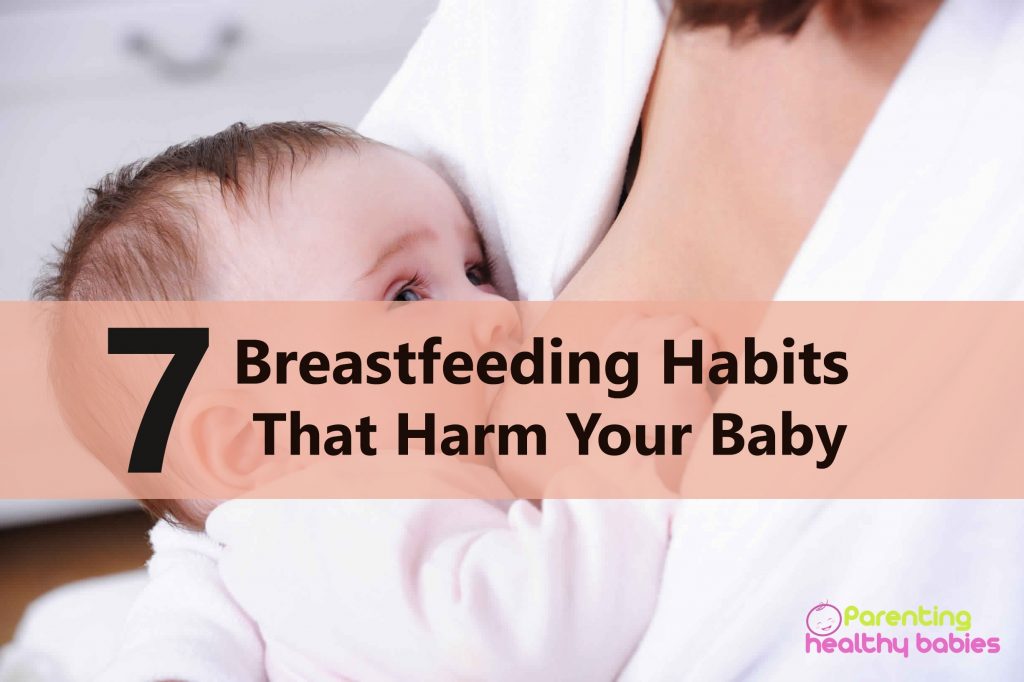Breastfeeding is one single marvelous gift that a mother can give to her baby. It greatly enhances a baby’s health, nutrition and excellent growth. Breastfeeding benefits a baby and a mother as well. Infant formula lacks protective mother’s antibodies and the perfect balance of nutrients that breast milk offers. Exclusive breastfeeding is recommended for the first 6 months of a baby’s life.
Benefits of breastfeeding include
- Protection from infant illnesses for your baby. Breast milk contains antibodies that help fight infections.
- Excellent nutrition source for baby
- Lifetime of good health for babies
- More intelligent babies
- Reduced risk of depression, diabetes and breast and ovarian cancer for mothers.
Breastfeeding needs to be done the right way, to ensure your baby gets maximum advantage out of it. There are a few mistakes that mothers make inadvertently, that can lead to diminished utility of breastfeeding for your baby.
7 Breastfeeding Habits Which Harm Your Baby
- Uncomfortable baby positions
Breastfeeding is not easy for a new mother. It is important to get comfortable while breast feeding to ensure adequate feeding time for your baby. If your arms are not supported, you may feel pinching or fatigue as you will tire soon. The baby also has to make greater effort to reach the milk if not well positioned and will feed less due to fatigue. So use pillows or cushions to support your arm and the baby, sit on a comfortable bed or chair, use a foot rest if needed or lie down on your side.
Take a look at a few good positions for breastfeeding –
- Cross cradle hold (tummy to tummy)
- Football hold (baby cradled in mother’s arm)
- Side lying position (both baby and mother lying on sides)
- Infrequent breastfeeding
A mother should breastfeed her baby every 1-3 hours on an average, on baby’s demand. If a baby is infrequently fed, breast milk will accumulate in the breasts. Failure to drain the breast milk can result in breast engorgement or swelling, mastitis and blocked breast ducts as well as pain. This leads to reduction in milk flow and poor nutrition for the baby. If a baby is not suckling enough, a breast pump may be used to drain the breast milk and stored for future use.
- Poor attachment or latching
For good breastfeeding, it is important that a baby achieves a good attachment to the mother’s breast, which is called latching or latch on. For effective latch on, a baby’s mouth should surround the tip of your nipple and about one inch of the areola. If the baby is latched well onto the breast, breastfeeding will be comfortable for both mother and baby. If the baby is improperly latched, breastfeeding may result in sore and fissured nipples, pain during breastfeeding and cracks on the breast. This results in inadequate breastfeeding and reduced nutrition for the baby since the pain prevents the mother from breastfeeding her baby well.
- Incomplete milk removal
If milk is left incompletely drained from the breast, problems such as decreased milk production and breast engorgement may occur. This can further lead to breast inflammation or mastitis. This results in poor feeding for the baby as milk does not flow well in these conditions. Complete emptying of milk from one breast followed by the other breast will help prevent this problem. Frequent feedings, warm breast compresses, massage or using a breast pump may aid in this problems.
- Maternal physical health
New mothers are sometimes too worried about their baby and burdened with responsibilities. This takes a toll on a mother’s physical health and stamina. An undernourished mother lacks energy and desire to breastfeed. Take a look at a few tips for lactating mothers for good breastfeeding-
- A mother should eat a balanced diet with at least 1800 kilocalories per day.
- Adequate water and fluid intake as per thirst, to compensate water lost through milk. (about 32 ounces or 12 cups of water per day)
- Avoid tobacco and alcohol
- Take nutritional supplements only under a doctor’s advice.
- Avoid excessive or ‘crash’ dieting regimes.
- Maternal anxiety and depression
A new mother has natural concerns regarding breastfeeding and whether she will be able to perform it adequately. A new mother may be depressed (post partum depression), overworked, stressed and lack confidence in breastfeeding. These lead to poor attachment with the new baby and infrequent and decreased duration of breastfeeding, depriving a baby of much needed mother’s warmth and nutrition.
- Isolation
New motherhood is a tough job and so is the breastfeeding. However, a new mother may try to manage breastfeeding on her own, but the emotional and physical fatigue will drain her resources. Taking care of a new baby’s needs along with other home or work responsibilities can seem like a heavy burden initially. In turn, a baby does not get the best nutrition and tenderness from an exhausted mother who feels isolated and alone. Seeking help from one’s partner or husband is a good way to share the new parenting experience as well as receive help with baby positioning, household chores and stress relieving. Talking to friends who have breastfed their babies also helps to keep anxiety under control for a new mom.
Motherhood is a learning experience beginning from the time a baby is born. Breastfeeding gives a mother the opportunity to bond with her baby and develop a relationship that will blossom as time goes on. Enjoy the process and the fulfillment it brings. Happy feeding!
References
http://www.who.int/features/factfiles/breastfeeding/en/
https://www.ncbi.nlm.nih.gov/books/NBK148955/
http://www.cpmc.org/services/pregnancy/information/breastfeeding-techniques.html
